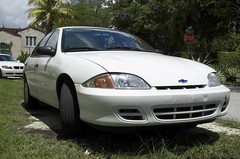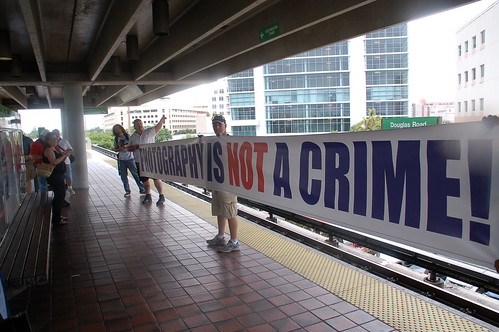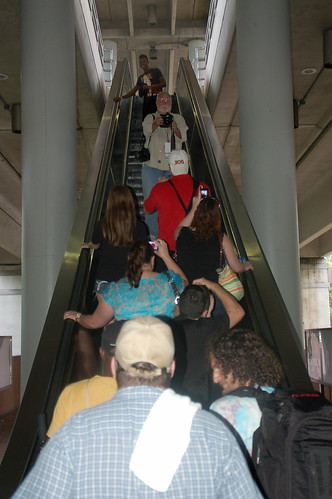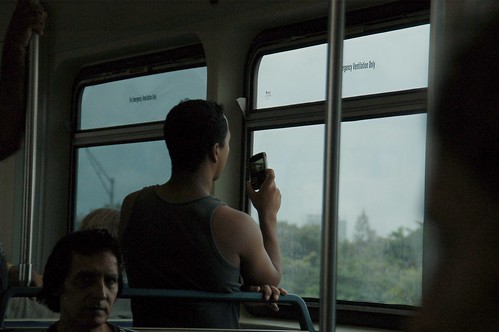Looking back, I realized just how many cars I've owned since moving to Florida. I paid cash for most of them, clunkers that I drove into the ground. Friends will tell you that I never have luck with my cars, but I think that considering what I paid for them, I did very well.
But I have to admit, no one has
ever dated me for my taste in automobiles.
1964 Rambler Classic (1982-1986) "Dame Elizabeth"

This is the car that brought me to Florida. It ran great, but had vacuum powered wipers. That is, instead of electric motors, it ran off the same
vacuum system that operated various valves in the engine. It was a real throwback, and on the surface it seemed like a cool idea because you could adjust the rate of the wipers by pulling a knob. However, stepping on the gas or the brakes also changed the rate - drastically.
One day, the pulley for the water pump shattered, and proved irreplaceable in pre-Internet America. The garage welded the pieces back together, but it was out of true, and every six months or so the inescapable wobble would destroy the water pump. Combined with the inability to see while driving in Florida's torrential summer squalls because of the wipers, I replaced it.
1978 Mercury Bobcat Station Wagon (1986-1987)

Bought from my boss at Rent-A-Center for about $700. Coldest A/C of any car I ever owned; there was a leak in the gas tank, so I couldn't fill it more than half-way. One spark plug socket had bad threads, so periodically the plug would pop out, forcing me to pull over, wait until the engine cooled before re-inserting it. The V6 engine eventually devoured the rings (as they always did on Fords, I later learned), leaving me the option of replacing the engine or the car. I chose the car.
1976 Chrysler Cordoba (1987-1989) "The Enterprise"

Biggest car I ever owned; I used to joke that the hood was so long it was like driving an aircraft carrier. The body was totally cherry, but the leather seats were rotted out; "fine Corinthian" my ass. But I wanted a car in excellent mechanical condition, and by god I got it. It ran great, but the 360 cubic inch V-8 sucked down fuel like it was going out of style. You could literally watch the needle move while cruising down the highway. I could not afford to drive this thing out of the county, let along out of state.
This is the car that taught me that a lot of mechanics are stupid. There are only two occasions where it needed any work, and both times I would have been better working on it myself. But I had no tools, and no place to work on it. The first time, the thing choked itself off. I had AAA tow it to Lake Worth's Auto Hospital, figuring they could work on it overnight (as advertised), and I could pick it up and drive to work the next morning without missing a beat. But when I called the following morning they hadn't had a chance to look at it. They told me it needed a tune-up, and it would be ready in "a few hours." Finally, I picked it up in the afternoon, but driving home it was still running rough. Not wanting to lose another day to the Auto Doctor, I stopped at an auto parts store, read the Chilton's manual, and sure enough when I opened the distributor cap it was full of rust. Somehow, the $50 tune-up didn't include checking that.
A year or so later, I was driving along I-95 when the engine just cut out. It was exactly like someone turned a switch. I had it towed to a garage - NOT the Auto Hospital - and they replaced a cheap component and pronounced it fixed. I was happy enough until it cut off again. Had it towed back. Now I was told that the carburetor needed to be rebuilt, and that my problem was caused by flooding. Well, I didn't believe him, but made him guarantee that the rebuilt carburetor would absolutely solve the problem. "Absolutely!" When I came to pick it up the next day, it wouldn't start. Turns out, there was a component in the ignition that went bad, causing it to stop conducting electricity once it got warmed up. His boss read him the riot act after learning I had said that "it just cut off" and that I had suggested "it's an ignition problem" when I filled out the paperwork. I only paid for the carburetor, the garage paid for the new ignition system.
It ran great after that. Still sucked down gas, though.
1980 Datsun 200SX (1989-1992)

I bought this with the proceeds of my first stint on a cruise ship, for about $1,200. This was a great little car, a 5-speed with a sun roof, a perfect replacement for the gas-guzzling Cordoba. It was stolen in 1991, after I left my key-ring in the door late one night; I had and armful of groceries and kicked the door shut without thinking. Thankfully, it was recovered a few months later.
It was recovered due to an electrical problem I'd been tracing down when it was stolen. I had been stranded several times with a dead battery, and I'd just put in a new battery when it was stolen. But I wasn't sure if the battery was the original cause or if the alternator was going bad. It was stolen before I could figure it out.
The police "found" the car during a traffic stop. They pulled it over because it was running without headlights after dark; the driver had discovered the battery wouldn't charge, so he tried to drive it only during the day, and only for short distances. He maintained that he didn't steal it; a friend "lent" it to him in exchange for some tools, and the guy wasn't suspicious because his friend had the keys. My keys. The car was on the road every day from the time it was stolen, and it was dumb luck that they found it.
I put in a used alternator that I got for $25, installed it using tools the guy had forfeit when the cops caught him in the car, and I drove it for another year, until someone ran a stop sign and broadsided me one night. Luckily, they hit just forward of the driver side door, so I escaped injury. But the car was bent into a new and exciting shape.
1980 Mazda B2000 (1991)

I bought this a few weeks after the 200SX was stolen I had been hauling a lot of equipment around, and thought that maybe this $500 pickup with the tool locker was the answer. It wasn't. The first time I locked tools in the locker, they were stolen. Piggy banks were more secure than that thing. So when I gigged around with my guitar, there was no place to lock my gear while I went out for a post-show drink. I stowed the guitar and amp in the locker one time, but I sweated it the whole time, knowing how easy it was to pry the lock off.
About the time I discovered that head gasket was blown, they found my beloved 200SX. So I scrapped the B2000, after trying to sell it for several weeks, in which time it, too, was stolen. Unlike the Datsun, it was stripped, and its carcass abandoned a few blocks away. The thieves netted four mis-matched tires, an aging K-Mart battery, and a stereo that ate cassette tapes. I considered myself lucky to get $125 for it as scrap.
1986 Mazda GLC (1992-1993)

The hatch didn't open. But it ran well enough, until the front right break caliper locked just enough to completely fry my right front wheel assembly. I was driving along I-95 at the time, smelled something burning, and looked in the rearview mirror and realized I was leaving a trail of smoke. It was pouring out of the wheel-well. When I got out and peered through the smoke, I could see that the brake disc was glowing white-hot, and metal was...dripping...out of the mechanism.
I just couldn't bring myself to fork over $1500 to repair an $800 car. Fortunately, Mom was moving to England for a year or two, and gave me her Mazda 626.
1984 Mazda 626 (1993-1997)

Free car that ended up costing me a bundle. My mother never missed an oil change or tune-up; the car came with a folder with the complete service history. The head gasket blew about 6 months after I got it. But it was an immaculate car, so I paid to fix it; so my "free" car cost me a grand, but it was a great car, right? Then flooding in Jupiter caused the starter to fill with water; $275 to have it rebuilt. Running off a rain-slick road, I miraculously avoided damaging the car - I thought. 6 months later, discovered that the transmission mounts had broken when I went off the road, and the transmission had been quietly chewing up the gears due to the misalignment. Rebuilt transmission: $2,000. But hey, mom took care of this car, so I can probably get another ten years out of it, right? The car started running hot: $125 bucks to replace the cooling fan motor - and that's getting a mechanic friend of my dad's to sell it to me at cost; the dealership wanted $275 for it. Then the radiator started leaking while I was on a trip; to make it home, I dumped "stop leak" in it. $500 to replace the radiator, but now the car was still overheating. Not only did the head gasket blow again, this time all four cylinders were cracked. I finally accepted that this fucking car was going to nickel and dime me to death, and scrapped it.
1989 Ford Escort (1998)

After scrapping the 626, I went out on cruise ships for a couple of years. I picked up the Escort for about $800 bucks when I settled in Fort Lauderdale to free-lance. It wasn't a great car, but a good deal for someone who didn't have a steady job right at the moment. After a couple of months of free-lancing, I ended up at Actors' Playhouse full time. Then I discovered that the soft brakes were much more intense than a master cylinder, and rather than replace the entire brake system, I sold it to the mechanic for a couple of hundred bucks, and bought another car.
1988 Honda Prelude (1998-2002)

Since I was working, I decided to get a car I really liked; but still unwilling to go into hock for a brand new car, this was the compromise. It cost me $2,500, and was worth every cent. It was another 5 speed, with an even better sun-roof than the 200SX. By 2002, it was showing its mileage and age, and when my dad gave me his old car, I was going to scrap it. But it was still running, and Mike Vines needed a car, so I gave it to him.
1997 Honda Accord SE (2002-2007)

My dad wanted an SUV, and decided the trade-in value was pitiful, so he gave me his Accord SE. What a sweet ride! Fully loaded, with aluminum wheels, sun roof, clean as a whistle, the only thing I didn't like was going back to an automatic transmission. This car was taking care of me, and I was taking care of it,
right up until it was stolen the day before Thanksgiving.
2001 Chevy Cavalier (2008- )

I needed a car, a friend needed to sell a car to finance a move to LA. Good karma. Merely adequate car.
I call it "The Last Chevy I Will Ever Own."
Why? All the little things; the dashboard that became brittle and cracked into a dozen pieces, the cupholders that are too small for many cups (and the ones that do fit block the A/C and vent controls), the compartment light that comes on no matter what and stays up for minutes after you leave the car, the mirror brackets made completely of plastic that get snapped off in a car wash. Very little thought went into the details of this car, and every time I drive it, I find myself being irritated by stupid petty design and construction choices that would have cost pennies to do right.
But it runs really well, for all that.







 Instead, Mark S. Roth, president of the condo association and the worst neighbor in human history, told the towing company to "tow it away." Which they did. And then they sold the $15,000 car for $1,448.88 to cover the cost of towing it and storing it.
Instead, Mark S. Roth, president of the condo association and the worst neighbor in human history, told the towing company to "tow it away." Which they did. And then they sold the $15,000 car for $1,448.88 to cover the cost of towing it and storing it. This is the car that brought me to Florida. It ran great, but had vacuum powered wipers. That is, instead of electric motors, it ran off the same
This is the car that brought me to Florida. It ran great, but had vacuum powered wipers. That is, instead of electric motors, it ran off the same 
 Biggest car I ever owned; I used to joke that the hood was so long it was like driving an aircraft carrier. The body was totally cherry, but the leather seats were rotted out; "fine Corinthian" my ass. But I wanted a car in excellent mechanical condition, and by god I got it. It ran great, but the 360 cubic inch V-8 sucked down fuel like it was going out of style. You could literally watch the needle move while cruising down the highway. I could not afford to drive this thing out of the county, let along out of state.
Biggest car I ever owned; I used to joke that the hood was so long it was like driving an aircraft carrier. The body was totally cherry, but the leather seats were rotted out; "fine Corinthian" my ass. But I wanted a car in excellent mechanical condition, and by god I got it. It ran great, but the 360 cubic inch V-8 sucked down fuel like it was going out of style. You could literally watch the needle move while cruising down the highway. I could not afford to drive this thing out of the county, let along out of state. I bought this with the proceeds of my first stint on a cruise ship, for about $1,200. This was a great little car, a 5-speed with a sun roof, a perfect replacement for the gas-guzzling Cordoba. It was stolen in 1991, after I left my key-ring in the door late one night; I had and armful of groceries and kicked the door shut without thinking. Thankfully, it was recovered a few months later.
I bought this with the proceeds of my first stint on a cruise ship, for about $1,200. This was a great little car, a 5-speed with a sun roof, a perfect replacement for the gas-guzzling Cordoba. It was stolen in 1991, after I left my key-ring in the door late one night; I had and armful of groceries and kicked the door shut without thinking. Thankfully, it was recovered a few months later. I bought this a few weeks after the 200SX was stolen I had been hauling a lot of equipment around, and thought that maybe this $500 pickup with the tool locker was the answer. It wasn't. The first time I locked tools in the locker, they were stolen. Piggy banks were more secure than that thing. So when I gigged around with my guitar, there was no place to lock my gear while I went out for a post-show drink. I stowed the guitar and amp in the locker one time, but I sweated it the whole time, knowing how easy it was to pry the lock off.
I bought this a few weeks after the 200SX was stolen I had been hauling a lot of equipment around, and thought that maybe this $500 pickup with the tool locker was the answer. It wasn't. The first time I locked tools in the locker, they were stolen. Piggy banks were more secure than that thing. So when I gigged around with my guitar, there was no place to lock my gear while I went out for a post-show drink. I stowed the guitar and amp in the locker one time, but I sweated it the whole time, knowing how easy it was to pry the lock off. The hatch didn't open. But it ran well enough, until the front right break caliper locked just enough to completely fry my right front wheel assembly. I was driving along I-95 at the time, smelled something burning, and looked in the rearview mirror and realized I was leaving a trail of smoke. It was pouring out of the wheel-well. When I got out and peered through the smoke, I could see that the brake disc was glowing white-hot, and metal was...dripping...out of the mechanism.
The hatch didn't open. But it ran well enough, until the front right break caliper locked just enough to completely fry my right front wheel assembly. I was driving along I-95 at the time, smelled something burning, and looked in the rearview mirror and realized I was leaving a trail of smoke. It was pouring out of the wheel-well. When I got out and peered through the smoke, I could see that the brake disc was glowing white-hot, and metal was...dripping...out of the mechanism. Free car that ended up costing me a bundle. My mother never missed an oil change or tune-up; the car came with a folder with the complete service history. The head gasket blew about 6 months after I got it. But it was an immaculate car, so I paid to fix it; so my "free" car cost me a grand, but it was a great car, right? Then flooding in Jupiter caused the starter to fill with water; $275 to have it rebuilt. Running off a rain-slick road, I miraculously avoided damaging the car - I thought. 6 months later, discovered that the transmission mounts had broken when I went off the road, and the transmission had been quietly chewing up the gears due to the misalignment. Rebuilt transmission: $2,000. But hey, mom took care of this car, so I can probably get another ten years out of it, right? The car started running hot: $125 bucks to replace the cooling fan motor - and that's getting a mechanic friend of my dad's to sell it to me at cost; the dealership wanted $275 for it. Then the radiator started leaking while I was on a trip; to make it home, I dumped "stop leak" in it. $500 to replace the radiator, but now the car was still overheating. Not only did the head gasket blow again, this time all four cylinders were cracked. I finally accepted that this fucking car was going to nickel and dime me to death, and scrapped it.
Free car that ended up costing me a bundle. My mother never missed an oil change or tune-up; the car came with a folder with the complete service history. The head gasket blew about 6 months after I got it. But it was an immaculate car, so I paid to fix it; so my "free" car cost me a grand, but it was a great car, right? Then flooding in Jupiter caused the starter to fill with water; $275 to have it rebuilt. Running off a rain-slick road, I miraculously avoided damaging the car - I thought. 6 months later, discovered that the transmission mounts had broken when I went off the road, and the transmission had been quietly chewing up the gears due to the misalignment. Rebuilt transmission: $2,000. But hey, mom took care of this car, so I can probably get another ten years out of it, right? The car started running hot: $125 bucks to replace the cooling fan motor - and that's getting a mechanic friend of my dad's to sell it to me at cost; the dealership wanted $275 for it. Then the radiator started leaking while I was on a trip; to make it home, I dumped "stop leak" in it. $500 to replace the radiator, but now the car was still overheating. Not only did the head gasket blow again, this time all four cylinders were cracked. I finally accepted that this fucking car was going to nickel and dime me to death, and scrapped it. After scrapping the 626, I went out on cruise ships for a couple of years. I picked up the Escort for about $800 bucks when I settled in Fort Lauderdale to free-lance. It wasn't a great car, but a good deal for someone who didn't have a steady job right at the moment. After a couple of months of free-lancing, I ended up at Actors' Playhouse full time. Then I discovered that the soft brakes were much more intense than a master cylinder, and rather than replace the entire brake system, I sold it to the mechanic for a couple of hundred bucks, and bought another car.
After scrapping the 626, I went out on cruise ships for a couple of years. I picked up the Escort for about $800 bucks when I settled in Fort Lauderdale to free-lance. It wasn't a great car, but a good deal for someone who didn't have a steady job right at the moment. After a couple of months of free-lancing, I ended up at Actors' Playhouse full time. Then I discovered that the soft brakes were much more intense than a master cylinder, and rather than replace the entire brake system, I sold it to the mechanic for a couple of hundred bucks, and bought another car. Since I was working, I decided to get a car I really liked; but still unwilling to go into hock for a brand new car, this was the compromise. It cost me $2,500, and was worth every cent. It was another 5 speed, with an even better sun-roof than the 200SX. By 2002, it was showing its mileage and age, and when my dad gave me his old car, I was going to scrap it. But it was still running, and Mike Vines needed a car, so I gave it to him.
Since I was working, I decided to get a car I really liked; but still unwilling to go into hock for a brand new car, this was the compromise. It cost me $2,500, and was worth every cent. It was another 5 speed, with an even better sun-roof than the 200SX. By 2002, it was showing its mileage and age, and when my dad gave me his old car, I was going to scrap it. But it was still running, and Mike Vines needed a car, so I gave it to him.  My dad wanted an SUV, and decided the trade-in value was pitiful, so he gave me his Accord SE. What a sweet ride! Fully loaded, with aluminum wheels, sun roof, clean as a whistle, the only thing I didn't like was going back to an automatic transmission. This car was taking care of me, and I was taking care of it,
My dad wanted an SUV, and decided the trade-in value was pitiful, so he gave me his Accord SE. What a sweet ride! Fully loaded, with aluminum wheels, sun roof, clean as a whistle, the only thing I didn't like was going back to an automatic transmission. This car was taking care of me, and I was taking care of it, 
 The
The  So, Kelly, you find boobies to be sexually suggestive? Really?
So, Kelly, you find boobies to be sexually suggestive? Really?  Are you a man, or are you a booby?
Are you a man, or are you a booby?




